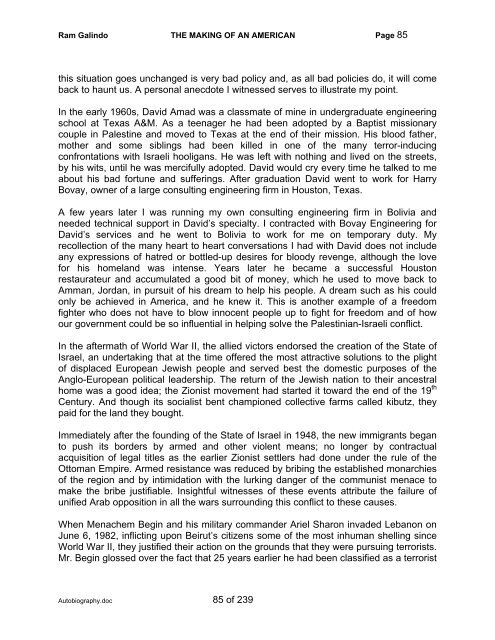Autobiography - The Galindo Group
Autobiography - The Galindo Group
Autobiography - The Galindo Group
You also want an ePaper? Increase the reach of your titles
YUMPU automatically turns print PDFs into web optimized ePapers that Google loves.
Ram <strong>Galindo</strong> THE MAKING OF AN AMERICAN Page 85<br />
this situation goes unchanged is very bad policy and, as all bad policies do, it will come<br />
back to haunt us. A personal anecdote I witnessed serves to illustrate my point.<br />
In the early 1960s, David Amad was a classmate of mine in undergraduate engineering<br />
school at Texas A&M. As a teenager he had been adopted by a Baptist missionary<br />
couple in Palestine and moved to Texas at the end of their mission. His blood father,<br />
mother and some siblings had been killed in one of the many terror-inducing<br />
confrontations with Israeli hooligans. He was left with nothing and lived on the streets,<br />
by his wits, until he was mercifully adopted. David would cry every time he talked to me<br />
about his bad fortune and sufferings. After graduation David went to work for Harry<br />
Bovay, owner of a large consulting engineering firm in Houston, Texas.<br />
A few years later I was running my own consulting engineering firm in Bolivia and<br />
needed technical support in David’s specialty. I contracted with Bovay Engineering for<br />
David’s services and he went to Bolivia to work for me on temporary duty. My<br />
recollection of the many heart to heart conversations I had with David does not include<br />
any expressions of hatred or bottled-up desires for bloody revenge, although the love<br />
for his homeland was intense. Years later he became a successful Houston<br />
restaurateur and accumulated a good bit of money, which he used to move back to<br />
Amman, Jordan, in pursuit of his dream to help his people. A dream such as his could<br />
only be achieved in America, and he knew it. This is another example of a freedom<br />
fighter who does not have to blow innocent people up to fight for freedom and of how<br />
our government could be so influential in helping solve the Palestinian-Israeli conflict.<br />
In the aftermath of World War II, the allied victors endorsed the creation of the State of<br />
Israel, an undertaking that at the time offered the most attractive solutions to the plight<br />
of displaced European Jewish people and served best the domestic purposes of the<br />
Anglo-European political leadership. <strong>The</strong> return of the Jewish nation to their ancestral<br />
home was a good idea; the Zionist movement had started it toward the end of the 19 th<br />
Century. And though its socialist bent championed collective farms called kibutz, they<br />
paid for the land they bought.<br />
Immediately after the founding of the State of Israel in 1948, the new immigrants began<br />
to push its borders by armed and other violent means; no longer by contractual<br />
acquisition of legal titles as the earlier Zionist settlers had done under the rule of the<br />
Ottoman Empire. Armed resistance was reduced by bribing the established monarchies<br />
of the region and by intimidation with the lurking danger of the communist menace to<br />
make the bribe justifiable. Insightful witnesses of these events attribute the failure of<br />
unified Arab opposition in all the wars surrounding this conflict to these causes.<br />
When Menachem Begin and his military commander Ariel Sharon invaded Lebanon on<br />
June 6, 1982, inflicting upon Beirut’s citizens some of the most inhuman shelling since<br />
World War II, they justified their action on the grounds that they were pursuing terrorists.<br />
Mr. Begin glossed over the fact that 25 years earlier he had been classified as a terrorist<br />
<strong>Autobiography</strong>.doc 85 of 239


